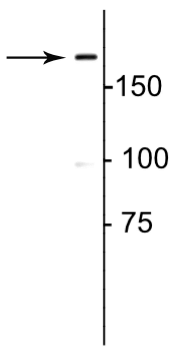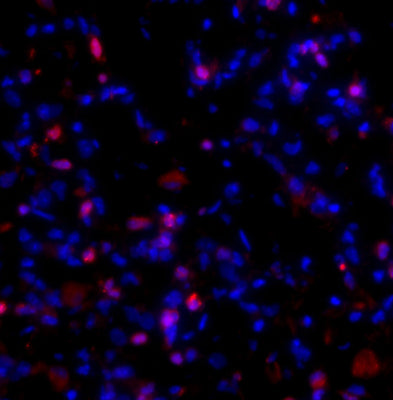Anti-Collagen 1, alpha 1 propeptide Antibody
Our Anti-Collagen 1, alpha 1 propeptide primary antibody from PhosphoSolutions is rabbit polyclonal.
- 产品详情
- 实验流程
- 背景知识
Application
| WB, IHC |
|---|---|
| Primary Accession | P02452 |
| Host | Rabbit |
| Clonality | Polyclonal |
| Isotype | IgG |
| Calculated MW | 138911 Da |
| Gene ID | 1277 |
|---|---|
| Other Names | Alpha 1 type I collagen antibody, Alpha 2 type I collagen antibody, alpha 2 type I procollagen antibody, alpha 2(I) procollagen antibody, alpha 2(I)-collagen antibody, Alpha-1 type I collagen antibody, alpha1(I) procollagen antibody, CO1A1_HUMAN antibody, COL1A1 antibody, COL1A2 antibody, collagen alpha 1 chain type I antibody, Collagen alpha-1(I) chain antibody, collagen alpha-1(I) chain preproprotein antibody, Collagen I alpha 1 polypeptide antibody, Collagen I alpha 2 polypeptide antibody, collagen of skin tendon and bone, alpha-1 chain antibody, collagen of skin tendon and bone alpha-2 chain antibody, Collagen type I alpha 1 antibody, Collagen type I alpha 2 antibody, EDSC antibody, OI1 antibody, OI2 antibody, OI3 antibody, OI4 antibody, pro-alpha-1 collagen type 1 antibody, type I proalpha 1 antibody, type I procollagen alpha 1 chain antibody, Type I procollagen antibody |
| Target/Specificity | Collagen is an extracellular matrix protein that serves as a scaffold defining the shape and mechanical properties of many tissues and organs including skin, tendon, artery walls, fibrocartilage, bone and teeth. Type 1 collagen is the most abundant protein in mammals. Collagens are synthesized with N-terminal and C-terminal propeptides that are cleaved during maturation and secretion. After cleavage of the propeptides, the most N-terminal and C-terminal remaining sequences are known as telopeptides. Mutations in the collagen 1, alpha 1 gene (COL1A1) are known to cause osteogenesis imperfecta (aka brittle bone disease) (Byers 1989). Furthermore, mutations found in the first 90 residues of the helical region of alpha 1 collagen have been implicated in the prevention or delayed removal of the procollagen N-propeptide leading to a combined osteogenesis imperfecta and Ehlers-Danlos syndrome (EDS) phenotype (Cabral et al., 2005) |
| Dilution | WB~~1:1000 IHC~~1:100~500 |
| Format | Antigen Affinity Purified |
| Storage | Maintain refrigerated at 2-8°C for up to 6 months. For long term storage store at -20°C in small aliquots to prevent freeze-thaw cycles. |
| Precautions | Anti-Collagen 1, alpha 1 propeptide Antibody is for research use only and not for use in diagnostic or therapeutic procedures. |
| Shipping | Blue Ice |
For Research Use Only. Not For Use In Diagnostic Procedures.
Provided below are standard protocols that you may find useful for product applications.
BACKGROUND
Collagen is an extracellular matrix protein that serves as a scaffold defining the shape and mechanical properties of many tissues and organs including skin, tendon, artery walls, fibrocartilage, bone and teeth. Type 1 collagen is the most abundant protein in mammals. Collagens are synthesized with N-terminal and C-terminal propeptides that are cleaved during maturation and secretion. After cleavage of the propeptides, the most N-terminal and C-terminal remaining sequences are known as telopeptides. Mutations in the collagen 1, alpha 1 gene (COL1A1) are known to cause osteogenesis imperfecta (aka brittle bone disease) (Byers 1989). Furthermore, mutations found in the first 90 residues of the helical region of alpha 1 collagen have been implicated in the prevention or delayed removal of the procollagen N-propeptide leading to a combined osteogenesis imperfecta and Ehlers-Danlos syndrome (EDS) phenotype (Cabral et al., 2005)
终于等到您。ABCEPTA(百远生物)抗体产品。
点击下方“我要评价 ”按钮提交您的反馈信息,您的反馈和评价是我们最宝贵的财富之一,
我们将在1-3个工作日内处理您的反馈信息。
如有疑问,联系:0512-88856768 tech-china@abcepta.com.























 癌症的基本特征包括细胞增殖、血管生成、迁移、凋亡逃避机制和细胞永生等。找到癌症发生过程中这些通路的关键标记物和对应的抗体用于检测至关重要。
癌症的基本特征包括细胞增殖、血管生成、迁移、凋亡逃避机制和细胞永生等。找到癌症发生过程中这些通路的关键标记物和对应的抗体用于检测至关重要。 为您推荐一个泛素化位点预测神器——泛素化分析工具,可以为您的蛋白的泛素化位点作出预测和评分。
为您推荐一个泛素化位点预测神器——泛素化分析工具,可以为您的蛋白的泛素化位点作出预测和评分。 细胞自噬受体图形绘图工具为你的蛋白的细胞受体结合位点作出预测和评分,识别结合到自噬通路中的蛋白是非常重要的,便于让我们理解自噬在正常生理、病理过程中的作用,如发育、细胞分化、神经退化性疾病、压力条件下、感染和癌症。
细胞自噬受体图形绘图工具为你的蛋白的细胞受体结合位点作出预测和评分,识别结合到自噬通路中的蛋白是非常重要的,便于让我们理解自噬在正常生理、病理过程中的作用,如发育、细胞分化、神经退化性疾病、压力条件下、感染和癌症。







